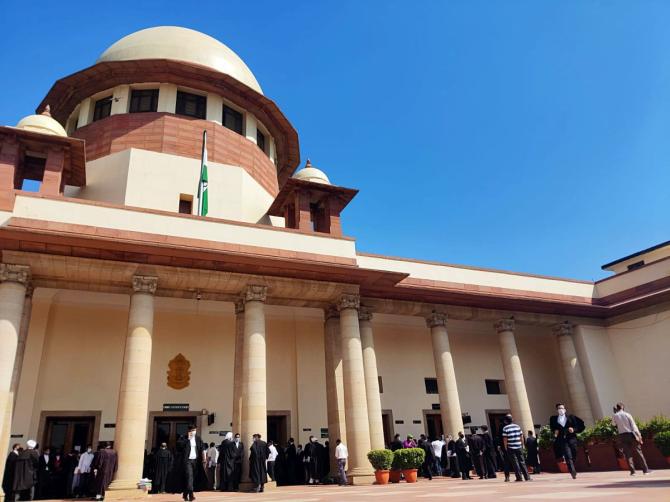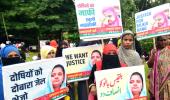Following are the highlights of the Supreme Court judgement pronounced on Monday quashing the Gujarat government's decision to grant remission to 11 convicts in the case of gang-rape of Bilkis Bano and murder of seven of her family members during the 2002 riots in the state.

IMAGE: A view of the Supreme Court of India. Photograph: ANI Photo
The top court said that the orders were "stereotyped" and passed without application of mind.
- The writ petition filed by Bilkis Bano under Article 32 of the Constitution before the Supreme Court court is maintainable. It was not mandatory for her to approach HC.
- Since the writ petition filed by the victim has been entertained by us, the writ petitions filed as PIL challenging remission are maintainable and kept open to be raised in any other appropriate case.
- The Gujarat government had no jurisdiction to entertain the prayers seeking remission of the sentence of the convicts as it was not the appropriate government within the meaning of Section 432 of CrPC.
- SC holds as 'nullity' and non est (Latin term meaning not found) in law the May 13, 2022 order of another bench asking the Gujarat government to consider remission plea of convicts.
- SC says the Gujarat government passed stereotyped and cyclostyled remission orders.
- Impugned orders of remission passed by the Gujarat government in favour of convicts are not in accordance with the law.
- Gujarat government had usurped the powers of the state of Maharashtra which alone could have considered the applications seeking remission.
- The remission policy dated July 9, 1992, of the state of Gujarat was not applicable to the convicts, says SC.
- The state of Gujarat acted in tandem and was complicit with one of the convicts Radheshyam Shah.
- The most important constitutional value is personal liberty which is a fundamental right enshrined in Article 21 of our Constitution.
- The judiciary is the guardian of the rule of law and the central pillar of a democratic State.
- The court must be a beacon in upholding the rule of law failing which it would give rise to an impression that the apex court is not serious about the rule of law.
- In a democracy where the rule of law is its essence, it has to be preserved and enforced, particularly by courts of law.
- Rule of law does not mean protection to a fortunate few.
- Article 142 of the Constitution cannot be invoked by SC in favour of convicts to allow them to remain out of jail.
- SC directs convicts to report to the jail authorities concerned within two weeks from today (Monday).











 © 2025
© 2025